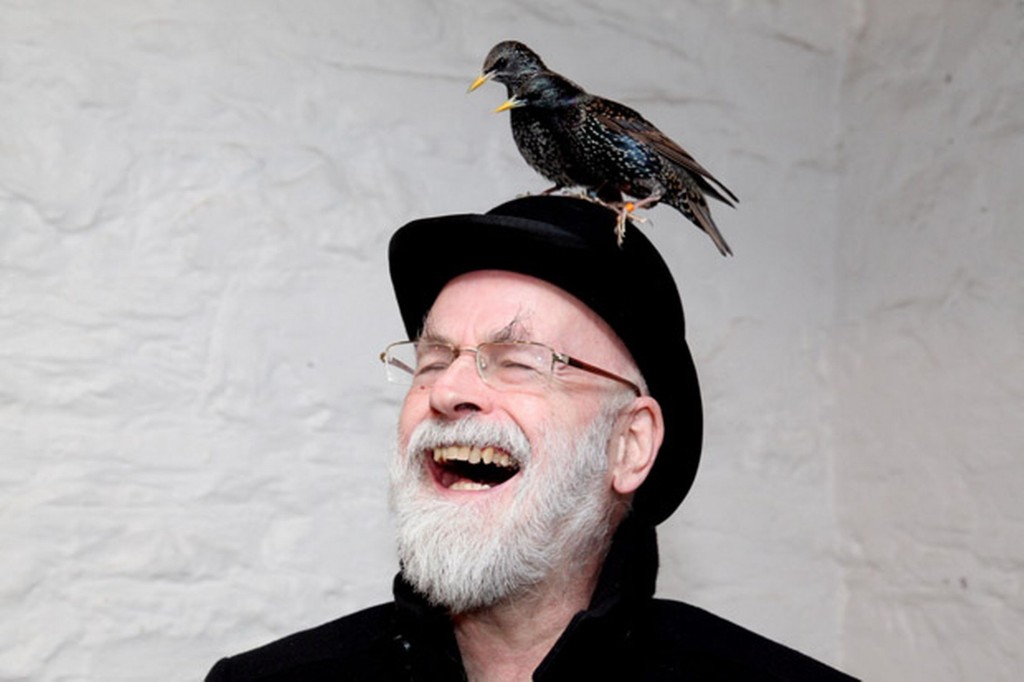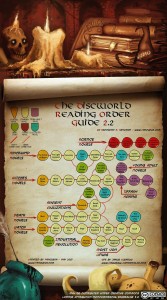Sir Terry Pratchett, author of scores of novels including the sprawling Discworld series, died yesterday at the age of 66. He was diagnosed with Alzheimer’s in 2007, but continued writing, finishing his final book last summer.
Pratchett was a comic genius. Howard Tayler, author of Schlock Mercenary, held up Pratchett’s work as a hallmark of comedy, and said that there are some things that, if you don’t find them funny, you won’t find anything funny. He was a master of world building, creating the Discworld, a disc shaped world on the back of four elephants swimming through space on a giant turtle named Great A’Tuin, and populating it with a range of characters full of personality and foibles.
How did you first encounter the work of Terry Pratchett? What “hooked” you?
Karen: My introduction to Terry Pratchett was the novel Good Omens (1990), a novel about the apocalypse. The character descriptions in the first few pages won me over thoroughly. Crowley, a demon who didn’t fall so much as saunter vaguely downwards. In the years since, I’ve picked my way through some of the Discworld series, choosing mostly books from the Witches arc and his satirical one-shots.
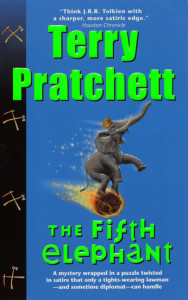 Stewart: I picked up The Fifth Elephant while on a family vacation when I was in middle or early high school. I’d run out of books, and, well, an elephant surfing on a fiery comet was far more exciting to me than anything else in the store.
Stewart: I picked up The Fifth Elephant while on a family vacation when I was in middle or early high school. I’d run out of books, and, well, an elephant surfing on a fiery comet was far more exciting to me than anything else in the store.
I was immediately enraptured, of course. Mystery, adventure, fantasy, and hilarity rolled into one? Sign me up. I’d finished it before the trip was over and purchased three more Discworld books entirely at random (heretically judging the books by their covers — it had worked the first time) to take home with me. Within the year I had acquired over a dozen Discworld novels, and trips to the bookstore became a scavenger hunt for the books I still didn’t have. Bliss.
Steph: I swiped the Light Fantastic, the second book of the Discworld series, from my sister’s bookshelf when I was about 12. I was just discovering what would become an epic love of books. I remember it being funny yet insightful. Pratchett could make me laugh one second and have me thinking existential thoughts the next. I sought out every single Discworld novel and read them all in chronological order. I have read 39 of the 41 novels.
-J.: Steph is the one who introduced me to the Discworld series. We’re both bibliophiles with similar tastes, which means that I live with someone who can recommend books that I’ll love. I had known Pratchett from Good Omens, but it wasn’t until Steph handed me The Colour of Magic that I became a proper fan.
What is your favorite Terry Pratchett novel?
-J.: Small Gods. It became my favorite immediately after I finished reading it, and even though I still have to catch up with some of the more recent Pratchett books, I don’t see it being displaced. The construction of stories, myths, and religions is one of my favorite topics, so I’m partial to the tale of Brutha and Om in Small Gods. It also came right after Witches Abroad, which covers similar-but-different ground, and was my favorite novel until I read Small Gods (it was a short reign). It feels like Pratchett started to hit his stride at this time, when his Discworld stories were really beginning to dig into a fertile vein of Bigger Things. The turtle moves.
Steph: I honestly don’t think I could pick just one, but the witches (Equal Rites, Wyrd Sisters, Witches Abroad, Lords and Ladies, Maskerade, Carpe Jugulum, the Wee Free Men, Wintersmith, I Shall Wear Midnight, and his last, the Shepherd’s Crown) are my favorite. I grew up with a love of high fantasy and Celtic/British folklore, of which the witches are heavily influenced.
Stewart: Maybe it’s because it’s the series I’d started with, but the City Watch Books (Guards! Guards!, Men at Arms, Feet of Clay, Jingo, The Fifth Elephant, Night Watch, and Thud!) have always been… if not my favorites, at least the books I reread the most. But my favorite of these, and possibly of Discworld, is Night Watch. For me, it’s a culmination of everything Pratchett builds up in the previous five Watch novels, and hits home with surprising emotion. I wouldn’t recommend starting with Night Watch — it’s the payoff you get from having read all the others first, as have of the poignance springs from having come so far with Vimes and his motley band of lawmen.
Why read Pratchett? What do his books mean for you?
Karen: Pratchett’s novels are funny, witty, and cutting. Yet even at their funniest, they’re never frivolous. The novels are about religion, politics, pop culture, musical tropes, and also vampires, witches, magic and practicality, and what it means to be human (or a werewolf). They’re not all perfect–some are certainly better than others, but they all say something.
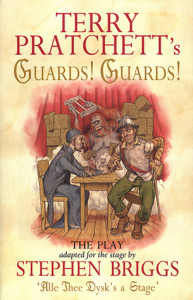
The stage adaptation of the first City Watch novel, Guards! Guards!
I have an infant son at home, and we’re reading the City Watch novels. No, I don’t expect my two month old to get anything substantive from the books, but I think he’ll start to grasp the sounds, the joy of language that the novels convey, and our pleasure in reading the books aloud to each other.
Stewart: When I was younger, Pratchett’s books were all about the laughs, and the satire seemed to be a convenient vehicle to tie more jokes to. As I got older, and started to re-read my favorites, I started to see that the satire was the key — more ferocious and instructive than I had given it credit for. You really only have to read one Discworld book to see that Pratchett isn’t writing all these books to impishly poke fun at the people he disagrees with–he has an important lesson on fairness, and he has no patience for those who would deny the dignity of another — via violence, intolerance, or sheer bloody ignorance. As Neil Gaiman wrote last year: “anger is the engine that drives him, but it is the greatness of spirit that deploys that anger on the side of the angels, or better yet for all of us, the orangutans.” (But seriously, how did the man get a knighthood?! –Karen)
-J.: I didn’t get into Pratchett until college, when my writing voice was already well-developed. What I read in Pratchett’s work was someone whose style could further influence and inspire me. I saw him also using parenthetical asides for humor, mixing of silliness with commentary that didn’t come off as remotely didactic, and the ability to both mimic and reference popular culture but make it something wholly his own. Amongst the authors I read ravenously, Pratchett’s style was the one that struck closest to how I liked to write.
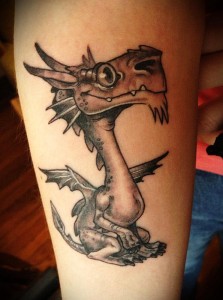
His name is Ned Saturday, which must be said with an English accent.
Steph: I think since I started reading the Discworld when I was so young, his writing became something that shaped what I grew up to be. Granny Weatherwax was my role model, I wanted to be as sharp and clever as she. Sam Vimes was quick and good on his feet, and always looked after those who couldn’t themselves. Each book had a character I could look up to or strongly identify with. Karen said it, some stories are better than others, but they all said something. There was a lesson in each one, folded in with relateable characters living in this lovingly-crafted world. If I had to choose a fictional world to live in, it would be the Discworld. I even got a tattoo of a Paul Kidby illustration inspired by the Discworld.
What else?
Stewart: I recommend any Discworld fan who has not yet read any of Pratchett’s non-Discworld novels to track down Strata. Written two years before Discworld’s first appearance in The Colour of Magic, Strata is sci-fi rather than fantasy, featuring the employees of a terraforming company stumbling across, of all things, a disc-shaped world. No giant turtles and elephants here, the disc in Strata is clearly an artificial construct, but the exploration of that disc is where the excitement happens — well, that and Pratchett’s trademark satire which, I dare say, is better represented here than in his early Discworld books.
I discovered Strata in a bookshop in England–having never seen a copy stateside (it’s still hard to find, but this is why the internet exists). Having read most of the Discworld novels by then, it was a joy to see a favorite author limbering up before creating something truly amazing–the artist’s study before creating the masterpiece. The adventure that unfolds involves rogue AIs, flying carpets, robots, and Vikings, but deep in my heart of hearts, I hope it’s the secret, uncredited prequel to the entire Discworld series.
Steph: Pratchett’s writing has that very dry wit that will make me laugh boisterously and uncontrollably. Like that time in college in Philosophy 101, where I was reading the Fifth Elephant in the back row and couldn’t help but laugh at a particularly funny bit… only to look up and realize the professor had been discussing thoughts on death throughout the ages. Awkward looks were had by all. Good times, good times.

